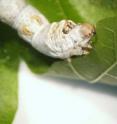The secret behind silkworm's hardy stomachs
Silkworms have a unique ability to eat toxic mulberry leaves without feeling ill, and researchers have come one step closer to understanding why: silkworms contain a special digestive enzyme that is not affected by mulberry’s toxic chemicals. Mulberry leaves contain an extremely high amount of alkaloids that inhibit enzymes that break down sucrose (sugar), and thus are potentially quite toxic. However, one type of sucrase called beta-fructofuranosidase is not affected by these alkaloids.
Until now, this enzyme has not been found in any animals, but Toru Shimada and colleagues believed this might explain the silkworm’s unique diet.
The researchers scanned the silkworm genome and discovered two fructofuranosidase genes, although only one was actually expressed in the worm. This gene (BmSuc1) was, as expected, concentrated in the worm’s gut, although surprisingly was also prevalent in the silk gland. When they isolated the enzyme from silkworms, the researchers found it could effectively digest sucrose.
Shimada and colleagues note that further work is needed to determine if this special enzyme is the sole reason for silkworm’s resistance to mulberry toxins. It’s possible that fructofuranosidases may turn up in other insects that cannot eat mulberry leaves, indicating additional factors are at work.
Source: American Society for Biochemistry and Molecular Biology
Other sources
- The Secret Behind Silkworm's Hardy Stomachsfrom Science DailyFri, 30 May 2008, 2:07:20 UTC
- The secret behind silkworm's hardy stomachsfrom PhysorgTue, 27 May 2008, 21:14:08 UTC
